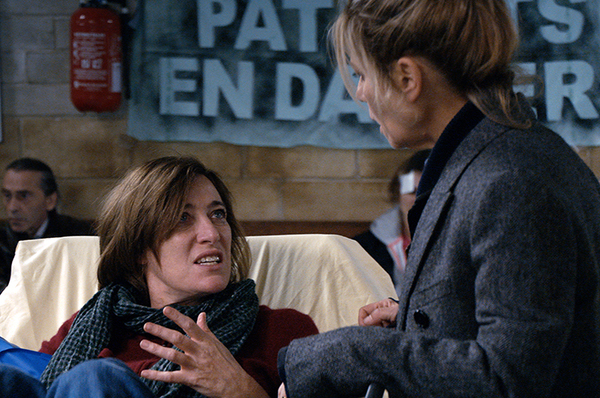Premiere
The Divide by Catherine Corsini
PostED ON OCTOBER 16
For the premiere of The Divide, screened this Friday at the UGC Confluence, its director Catherine Corsini gave us a behind-the-scenes glimpse into the film, selected at this year’s Cannes Film Festival. A hard-hitting yet luminous and entertaining work about the ills of our society and in particular those of the hospital system. Highlights…
A film born in the emergency room
It's a fiction film but I wanted a true representation of the hospital, with a lot of fantasy, light and humour: I didn't want it to be a burden for the audience. The idea for the movie came to me as a patient in the emergency room. I wanted to examine French society in this specific place: the hospital is a reflection of our society. What I discovered is heavier than the theme of the film: there is a great deal of social and psychological distress.
Filming
We wanted to shoot in a hospital, but because of Covid, it wasn't possible. While doing location scouting, we went to see the basement of the Edouard-Herriot hospital in Lyon. At the last minute, we were told that it was impossible because of the pandemic, so we had to find another set. We used the basement of Airbus to shoot, using the Lariboisière hospital in Paris as a model because I like its dark side.
 The Divide, 2021
The Divide, 2021
Aïssatou Diallo Sagna
We shot the film a year ago, in the middle of an epidemic. The casting was quite long- we saw 350 caregivers. It was important to consult health workers in order to validate the veracity of the medical processes. At the beginning, I was looking for an actress for the role of Kim, but I needed the natural sense of authority of a healthcare worker and the precision of the acts. During the casting process, I was lucky enough to meet Aïssatou Diallo Sagna, who is a nurse's aide, and we offered her the role of Kim. I think she brought the necessary strength and authority to this character.
Screening for caregivers
We presented the film to 200 caregivers at a special screening in Paris. They told us that the film was important to them, they hope it will have a resonance. We were overwhelmed by their opinion of the film. I don't know if cinema can change things, but the situation in hospitals has deteriorated with Covid and nothing has changed; they are cruelly understaffed.
The hospital in pain
Having seen documentaries on the hospital from 10 or 15 years ago, we realise that it is an increasingly violent place. There are assaults on caregivers, and emergency buttons have even been installed to alert people in these situations. There is an increasingly palpable violence. In the film, there is a question of the Yellow Vests protests and the daily life of caregivers: today there is a part of the population that is sacrificed and despised. I wanted to show how they are not listened to. Our biggest wish is that the film be seen; we would like those who are decision makers to be able to watch it and hear what it is saying. That's what cinema is all about: recreating what's going on.
Reported by Laura Lépine

